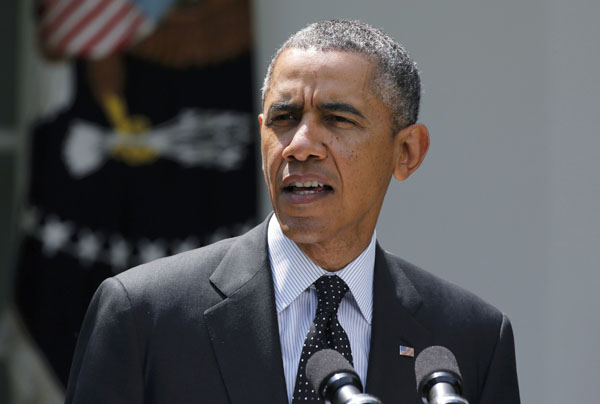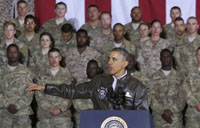 |
|
US President Barack Obama delivers an announcement on the number of US troops that will remain in Afghanistan after the formal troop drawdown at the end of this year, in the White House Rose Garden in Washington, May 27, 2014. [Photo/Agencies] |
WASHINGTON - President Barack Obama said on Wednesday in announcing a plan to leave 9,800 troops in Afghanistan in 2015 that Afghanistan will not be a perfect place and it is not up to the United States to make it one.
 |
| Obama?pays surprise visit to Afghanistan |
"We have to recognize that Afghanistan will not be a perfect place and it is not America's responsibility to make it one," Obama said in the White House Rose Garden.
He said American forces, first sent within a month of the Sept. 11, 2001, attacks, have struck significant blows against al-Qaida's leadership, eliminated Osama bin Laden and prevented Afghanistan from being used as a base against the US
"We have now been in Afghanistan longer than many Americans expected,'' Obama acknowledged during an appearance in the White House Rose Garden. ``Now we're finishing the job we've started.''
Even as Obama set a timetable for the drawdown, he said he would keep nearly 10,000 American troops in Afghanistan after the US combat mission formally ends later this year. Those troops would focus on training Afghan security forces and on counterterrorism efforts.
The president said his plan was contingent on the Afghan government signing a bilateral security agreement with the US Afghan President Hamid Karzai has refused to sign the accord, but the US is optimistic that the two candidates seeking to replace him in the ongoing Afghan elections will finalize the agreement. Both have pledged to sign it.
Obama's blueprint calls for cutting the current US force of 32,000 to 9,800 by the start of next year. Those troops, dispatched throughout Afghanistan, would not be engaged in combat missions.
Over the course of 2015, the number of troops would be cut in half and consolidated in the capital of Kabul and at Bagram Air Field, the main US base in Afghanistan. Those remaining forces would largely be withdrawn by the end of 2016, with fewer than 1,000 remaining behind to staff a security office in Kabul.
Noting the complexity of his drawdown plan, Obama said, "It's harder to end wars than to begin them.''
Obama's decision is largely in line with what military commanders have been seeking and will allow the president to fully end the American-led military effort by the time he leaves office in January 2017.
The American forces would probably be bolstered by a few thousand NATO troops. The total NATO presence, including US troops, is expected to be around 12,000 at the start of next year.
Obama announced the drawdown plan a day after returning from a surprise weekend trip to Afghanistan where he met with US commanders and American forces serving in the closing months of America's longest war.
Top Republicans criticized the plan before Obama had even announced it, taking issue with his decision to publicly declare that troops would be out of Afghanistan after 2016.
"President Obama is not ending wars, he's losing them,'' Sen. Lindsey Graham, R-South Carolina, a frequent critic of Obama's foreign policy, wrote on Twitter.
House Armed Services Committee Chairman Howard "Buck'' McKeon, R-California, praised Obama's troop levels but questioned his timing and said that in Iraq he had "abandoned the region to chaos.''
"Holding this mission to an arbitrary egg-timer doesn't make a lick of sense strategically,'' McKeon said.
Ahead of his remarks, Obama spoke with Karzai, who has had a tumultuous relationship with the White House. The two leaders did not see each other while Obama was in Afghanistan this weekend, but they did speak by phone as Air Force One was returning to Washington.
Obama has also discussed his plans with several European leaders, including German Chancellor Angela Merkel, British Prime Minister David Cameron and Italian Prime Minister Matteo Renzi.
US military commanders have been arguing for months to keep roughly 10,000 troops in Afghanistan, if only for a limited time, while they bolster the Afghan forces' ability to do long-term logistical planning and increase their air force capabilities. In recent weeks, the military had expressed confidence that they had been able to sell their plans to the White House.
Germany and Italy have said they will continue as lead nations in the north and west of Afghanistan, and there has been some discussion that the US would also have some troops in those areas to work with the allies.
After Karzai refused to sign the bilateral security agreement, Obama asked the Pentagon to plan for the possibility that all American forces would withdraw by a year-end 2014 deadline. But given the supportive comments of the candidates in Afghanistan's presidential election, Obama signaled during his holiday weekend trip to Bagram that he was likely to keep some American troops in the country.
"After all the sacrifices we've made, we want to preserve the gains that you have helped to win, and we're going to make sure that Afghanistan can never again, ever, be used again to launch an attack against our country,'' Obama declared.
At least 2,181 members of the US military have died during the nearly 13-year Afghan war and thousands more have been wounded.
